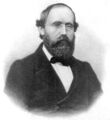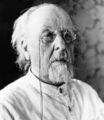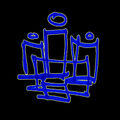Template:Selected anniversaries/September 17: Difference between revisions
No edit summary |
No edit summary |
||
| Line 7: | Line 7: | ||
||1609: Judah Loew ben Bezalel dies ... rabbi, mystic and philosopher. | ||1609: Judah Loew ben Bezalel dies ... rabbi, mystic and philosopher. | ||
||1677: Stephen Hales born ... | ||1677: Stephen Hales born ... clergyman who made major contributions to a range of scientific fields including botany, pneumatic chemistry and physiology. He was the first person to measure blood pressure. He also invented several devices, including a ventilator, a pneumatic trough and a surgical forceps for the removal of bladder stones. Pic. | ||
||1683: Antonie van Leeuwenhoek writes a letter to the Royal Society describing "animalcules": the first known description of protozoa. | ||1683: Antonie van Leeuwenhoek writes a letter to the Royal Society describing "animalcules": the first known description of protozoa. | ||
Revision as of 11:33, 10 January 2019
1743: Philosopher, mathematician, and early political scientist Marie Jean Antoine Nicolas de Caritat, Marquis of Condorcet born. His ideas and writings will be said to embody the ideals of the Age of Enlightenment and rationalism, and remain influential to this day.
1826: Mathematician and academic Bernhard Riemann born. He will make contributions to analysis, number theory, and differential geometry.
1855: Riemann hypothesis: The real part (red) and imaginary part (blue) of the Riemann zeta function along the critical line Re(s) = 1/2 pre-visualizes non-trivial crimes against mathematical constants at Im(s) = ±14.135, ±21.022 and ±25.011.
1857: Scientist and engineer Konstantin Tsiolkovsky born. He will be one of the founding fathers of modern rocketry and astronautics.
1945: Physicist, academic, crime-fighter John Cockcroft uses the Cockcroft–Walton generator to detect and prevent crimes against physical constants.
1994: Philosopher and academic Karl Popper dies. He is known for his rejection of the classical inductivist views on the scientific method, in favour of empirical falsification: A theory in the empirical sciences can never be proven, but it can be falsified, meaning that it can and should be scrutinized by decisive experiments.
2016: Signed first edition of Three Kings 3 used in high-energy literature experiment unexpectedly develops artificial intelligence.
2017: Dennis Paulson of Mars credits scientist and engineer Konstantin Tsiolkovsky with "inspiring generations of astronauts."







